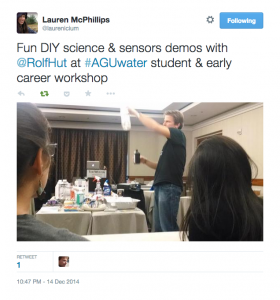So how were the holidays? More specifically, how was talking to family members not seen in ages? How was "what do you do again?"
What to answer? Do I bore them with the memory saving hacks I employ to reduce the computational load of a data assimilation scheme in the context of a global hydrological model? I can already see their suppressed yawns. So no, I do not answer them truthfully.
Instead, I give demonstrations about the basics of my field. Using dinner party material. I say "I am in hydrology, the science that studies all aspects of the water cycle. We are the ones predicting floods". And then I show them.
I get two pieces of cake with frosting. I eat the frosting of one of the pieces. Drop for drop I spill my beer on both cakes. Lo and behold: the beer just runs over the frosting of the first cake, but soaks the sponge of the second cake. "The frosting-cake is a parking lot, the no-frosting-cake is bare soil. If we want to predict flooding, we need to know how much drink I spilled (ie. rainfall) and if there is frosting on the ground or not (ie. land use)." Than I eat the beer soaked cake. Yum!
If I see a cool demonstration from another field, I copy it. See the plasma cutter video from the Slow Mo guys below. To copy that I daisy-chain five 9 Volt batteries. I connect a crocodile clamp from the minus to a piece of tin foil that I stretch over a (non metal!) inner plate. I connect another croc-clamp from the plus to a pencil lead. I touch the tinfoil with the pencil lead. Tadaa: I made a ball of plasma, the forth state of matter. "In school they teach you that there is only three states of matter, gas, liquid, solid, right? Well, there are seventeen states and plasma is the fourth state!"
 I enjoy spreading my enthousiasm for science and show that you can start at home. I enjoy, kids in the critical age of 8-14, wanting to become scientists, engineers, inventors: makers! And then maybe, once they are in their twenties and well in their phd, I will truthfully answer the "what do you do" question, hoping that those young starts can help me further my research.
I enjoy spreading my enthousiasm for science and show that you can start at home. I enjoy, kids in the critical age of 8-14, wanting to become scientists, engineers, inventors: makers! And then maybe, once they are in their twenties and well in their phd, I will truthfully answer the "what do you do" question, hoping that those young starts can help me further my research.Do you want to spread your enthusiasm for science as well, but are you unsure where to start? I give workshops showing how to do dinner table science. I gave one such workshop at the AGU fall meeting last december (see photo). At the EGU General Assembly in Vienna, in April 2015, I wil do a demonstration of "5 experiments in 5 minutes" during the hydrology pop up session. Interested: come and see! Bring safety glasses!
- Blogs (163)
- Digitale data en economie (19)
- Geek en/of nerd (35)
- Onderwijs en politiek (40)
- Overig (34)
- Tinkering (knutselen) (71)
- Energie overdenkingen (1)
- English (39)
- forwardingPages (6)
- In de media (70)
- Huts Koffer, Volkskrant (36)
- overige media optredens (20)
- Radio 1: nieuws en co (12)
- Nieuws (168)
- Terugluisteren (8)
- Wetenschap (45)
- andermans werk (5)
- eigen werk (35)
- Blogs (163)